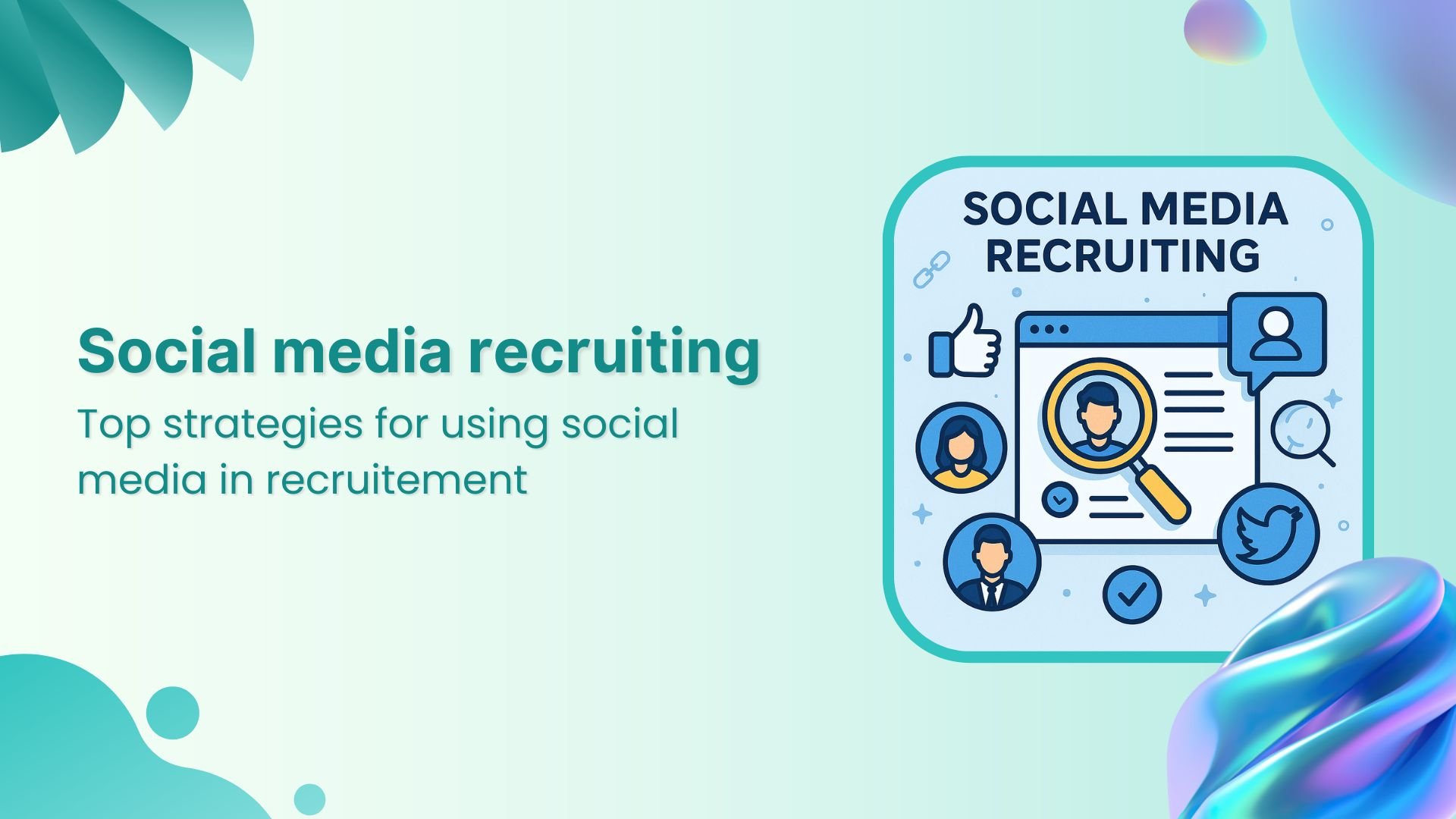Bulk-generate & schedule posts in seconds with Smart Scheduling. Try now!
LinkedIn SEO: Maximizing visibility and connections
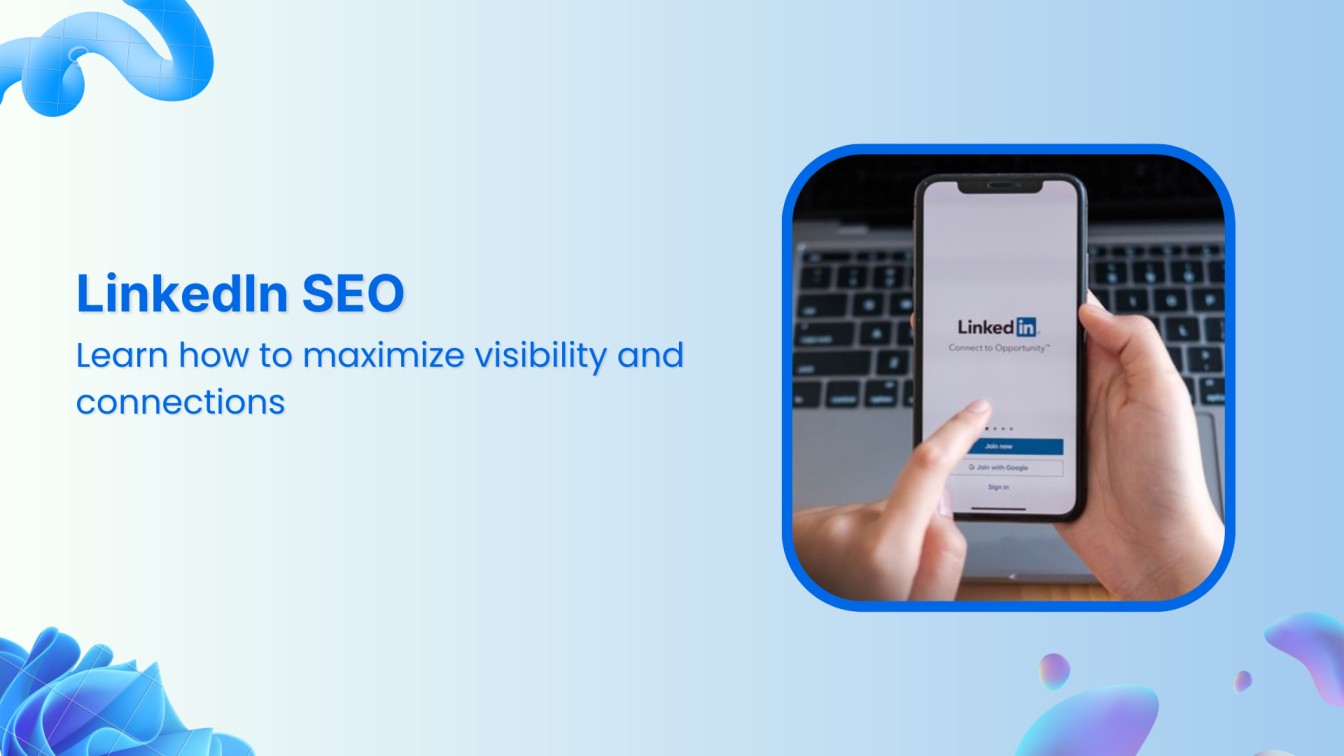
LinkedIn has been around for a while. Undoubtedly, it’s one of the top-tier social media platforms, with over one billion members globally.
Most people who aren’t making the most of their existence on LinkedIn are the ones who hopped on the platform but never invested time and energy into it.
LinkedIn is like any other major social media platform, requiring users to post original, valuable content to connect with like-minded people and grow followers.
LinkedIn Marketing Establish your brand’s profile on LinkedIn by consistently posting engaging content and engaging with the community.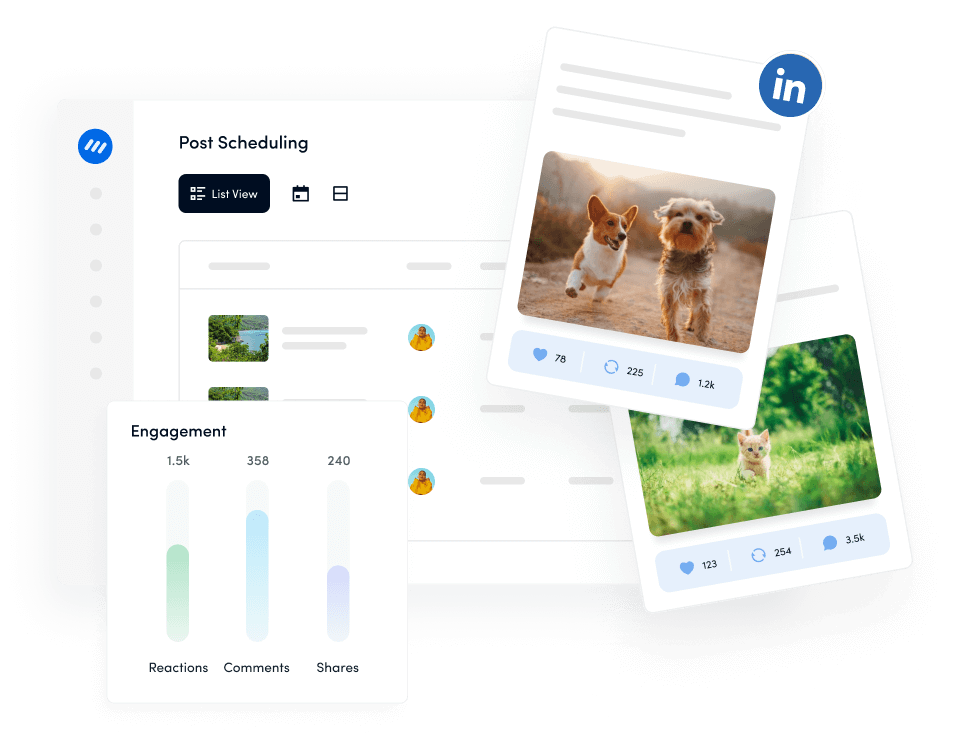
This is where the “LinkedIn SEO” comes into play. Users who know about SEO and content marketing try to implement fundamental SEO principles on LinkedIn to grow their impact, and rightly so.
Let’s uncover everything you need to know about LinkedIn SEO.
What is LinkedIn SEO?
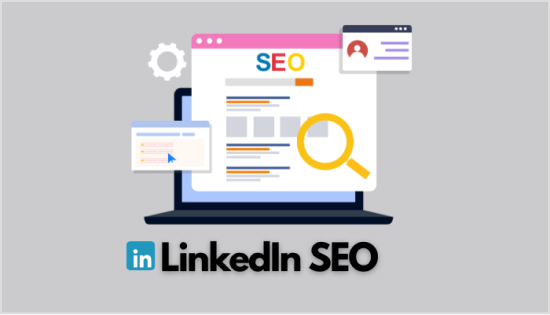
LinkedIn SEO refers to fine-tuning the LinkedIn content and profile to improve LinkedIn visibility, clickability, and engagement.
LinkedIn has a search feature to discover content, people, job vacancies, products, and businesses. Therefore, LinkedIn SEO optimizes the overall LinkedIn profile to gain attention, increase engagement, and drive conversions.
Multiple aspects of LinkedIn profile optimization ultimately contribute to LinkedIn SEO. Here are the key ones:
- User bio: The bio section is the top section of the LinkedIn profile, covering name, occupation/job title, organization, etc. Use it smartly to attract and engage new followers.
- About section: The “About” section is the introductory section of the profile. It functions as a profile description and explains the person’s background. It plays a huge role in LinkedIn profile optimization.
- Skills area: One of the sections of a LinkedIn profile is the “Skills.” It lets users add their skills to improve LinkedIn profile visibility in the search.
- Content strategy: Content strategy dictates what gets published on the platform. If done right, content fuels visibility, growth, and engagement. Designing a compelling LinkedIn strategy contributes to LinkedIn SEO.
All these elements contribute to LinkedIn SEO one way or the other.
Why is LinkedIn SEO important?
LinkedIn rivals all major social media platforms, such as Facebook, Twitter, Instagram, YouTube, and TikTok – it’s not a small social media network.
No wonder LinkedIn is in the one billion users club. Every user must ensure to put in the work to stand out from the crowd. Therefore, LinkedIn SEO is a tactic that could give users a competitive edge over others.
LinkedIn SEO is vital to increasing views, attracting eyeballs, and skyrocketing engagement on the platform. However, most LinkedIn users have no idea where to begin, when, or why it is so important.
We’ll walk you through the whole process, but you must first know why LinkedIn SEO is crucial to your LinkedIn success. Here are the five reasons why LinkedIn SEO is so important for users:
1. Improve profile visibility on the platform
No one wants to join a social media network to stay low-key. Social media is about putting yourself out there, being socially active, and connecting with like-minded people.
LinkedIn SEO is one way to improve profile visibility. Since SEO refers to keyword selection and content creation, the same principle applies to LinkedIn.

However, the only difference is that users should pick up the trending topics and hashtags to create content instead of keywords.
When the content is created (whether it’s the status, articles, videos, or audio) on LinkedIn consistently, the profile’s visibility gets better over time.
Thus, it leads to more profile views organically. This is why it’s essential to understand and implement LinkedIn SEO.
2. Gain more followers on LinkedIn
Social media success has several pillars, and one of those pillars is getting more followers no matter what social media platform you choose – LinkedIn is no different.
Therefore, users try to adopt different strategies; some work for some, while some don’t. However, it’s good to find tried-and-tested strategies to gain more followers.
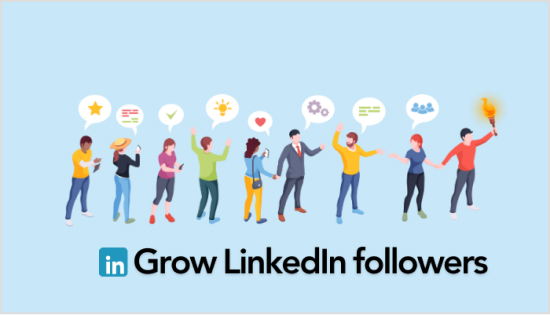
LinkedIn SEO is one of the popular strategies influencers and experts adopt to grow their follower base, so it’s necessary to learn how to do LinkedIn SEO.
It applies to every type of content you put out on LinkedIn, for example:
- Publish SEO-optimized articles on LinkedIn to get attention
- Use keywords in your LinkedIn videos for more visibility
- Write status on popular topics in your niche to stay relevant
- Follow industry-related hashtags on the platform
- Upload infographics designed around your niche, especially your area of expertise
- Comment on the content related to your industry to attract eyeballs
LinkedIn SEO can’t be divided into articles or video topics. It applies to every element of the profile, whether you’re writing a comment or updating your “About” section.
Therefore, it’s necessary to understand and apply LinkedIn SEO.
Also Read: How we gained 20K+ organic followers on LinkedIn via content marketing (A case study)
3. Optimize the profile for LinkedIn search
Creating an average LinkedIn profile isn’t going to cut it. It’s important to figure out how to create an impact with your presence on LinkedIn.
Optimizing a LinkedIn profile covers writing an effective About section, improving the bio section, updating the skills area, adding featured articles, showcasing recommendations, and displaying past experiences.
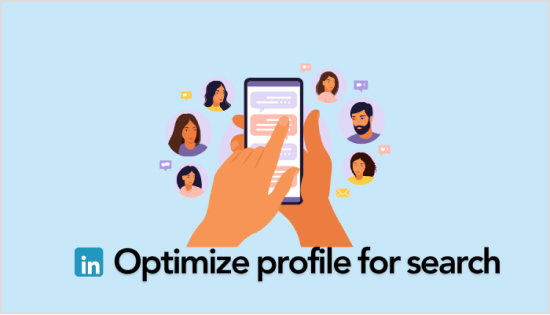
One core reason for emphasizing LinkedIn SEO is to ensure that the LinkedIn profile is well-optimized for LinkedIn searches. LinkedIn is a powerful search tool that allows users to find content being shared, job opportunities, and relevant people.
Related Read: 18 best LinkedIn tools that drive results in 2024
All major social media platforms, such as Facebook, Twitter, YouTube, Instagram, and TikTok, have a search feature that plays a key role in content discovery, gaining followers, and meeting relevant creators.
Unsurprisingly, LinkedIn profile optimization has an integral role in LinkedIn SEO. Neglecting such a tactic would be a blunder.
4. Get more connection requests

There are numerous reasons why LinkedIn SEO is crucial to any brand or individual, but one of them is that it helps you reach more people faster than ever.
One of the perks of deploying LinkedIn SEO tips is that you get more connection requests. This increases the visibility of your LinkedIn content and the attention your profile receives, resulting in the growth of your LinkedIn network.
It’s highly unlikely for social media users to like any content but don’t react to it or never follow the creator – it usually doesn’t happen. The audience always responds to good-quality content through likes, comments, shares, and follow.
So, new connection requests and follows are two organic outcomes of a powerful LinkedIn SEO strategy deployment.
5. Attract engagement through content

Engagement is a huge social media success factor, but it’s only possible when the user hits the bullseye by targeting the right audience using the appropriate content.
Undoubtedly, useful and high-quality content drives engagement. Therefore, SEO and social media experts are convinced that high-quality content for the right audience can bring great results.
LinkedIn SEO isn’t complete without posting great content on the platform. Posting effective and helpful LinkedIn content results in engagement, which stems from the traction the content receives.
So, it’s safe to say that engagement through content and LinkedIn SEO go hand-in-hand.
These are some reasons why LinkedIn SEO is crucial to establishing a successful LinkedIn content strategy.
The principles behind the LinkedIn algorithm
Social media experts agree that social media networks have certain algorithms that help them cater to their audience. However, one can disagree with every expert opinion on how to deal with these algorithms.
Every mainstream social media platform uses algorithms to sift through the content and bring out the most useful for the audience. Here are the four basic principles behind the LinkedIn algorithm:
1. User behavior to determine a user’s choices and priorities
User behavior is crucial to the process as it influences users’ choices and priorities, shaping what content they see. For example, if a user frequently engages with posts about entrepreneurship, LinkedIn will prioritize showing them similar content.
It’s pretty much the same on every major social media platform. The type of content a user starts to consume, the platform would start to show more of such content. So, the LinkedIn algorithm keeps a closer look at the user behavior.
2. LinkedIn relevance score for discovering similar content
One of the fundamentals of the LinkedIn algorithm is the relevance of the content for the user. The platform analyzes user preferences and provides the most relevant content going forward.
LinkedIn’s algorithm assesses the relevance of content based on various factors, such as search terms, engagement signals, and user interactions. It then recommends content with a high relevance score to users who have shown interest in similar topics.
3. Showcasing connections’ content to entice the user to action
LinkedIn is likely to showcase content shared by a user’s LinkedIn connections. It can influence their actions on the platform.
If someone frequently interacts with posts from a particular connection, LinkedIn may prioritize showing more content from that person in their feed. This algorithm strategy isn’t limited to LinkedIn; YouTube, Facebook, and Twitter do this as well.
4. Suggested content based on engagement activities
One of the core functions of the algorithm on any social media network is that it’s good at understanding what content to suggest to the user based on engagement.
LinkedIn also suggests content to users based on their engagement activities, such as likes, comments, and shares. If a user writes a comment on a specific type of LinkedIn post, this user is likely to see similar content in the next few days.
It’s not rocket science to understand the LinkedIn algorithm. The more you spend time on the platform, the more you learn how to navigate.
LinkedIn SEO ranking factors
SEO for LinkedIn isn’t everyone’s cup of tea, so it’s important for us to explain every bit of LinkedIn SEO to make things easier for users. LinkedIn SEO optimization would be incomplete without understanding the LinkedIn SEO ranking factors. Let’s find out the key areas for LinkedIn SEO:
1. Members’ activities
Unsurprisingly, user activity could be a game-changer on LinkedIn, especially when focusing on LinkedIn SEO performance.
Members’ activities include discussions, content sharing, commenting, and liking. When a piece of content goes viral, or a trend becomes popular, everyone seems interested in it. Such interest and enthusiasm drive members’ activities on social media.
Social media attention is the backbone of social media virality that often instigates users’ activities, conversations, and commentary on social media.
To get the social media attention, a user needs a handful of tools, such as:
- Expertise/knowledge about a topic
- Must be connected with the right audience
- Showing up consistently on the platform
- Sharing useful, informative content
- Helping the audience without asking for favors
- Engage with members by commenting
All these things contribute to elevating the LinkedIn profile visibility through higher engagement on the platform.
It’s also important to design an effective LinkedIn content strategy to initiate members’ activities on LinkedIn content, as members’ activities are a crucial LinkedIn SEO ranking factor.
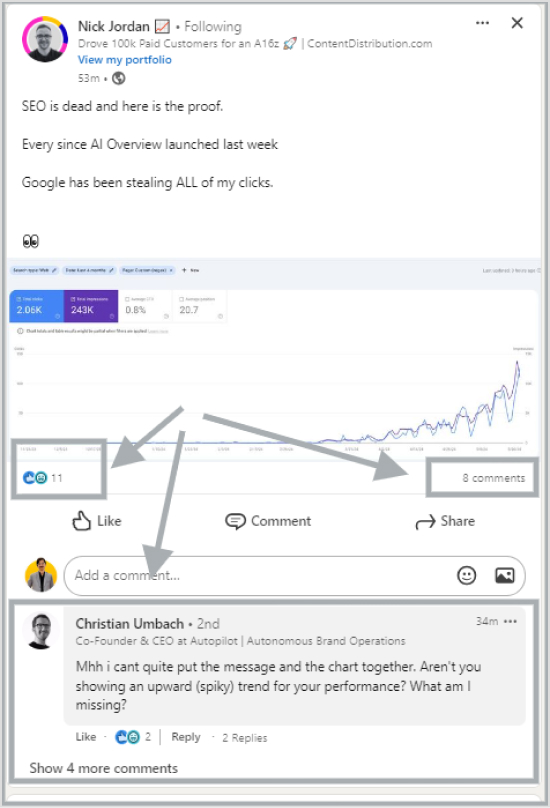
The above-mentioned LinkedIn post is a perfect example of the members’ activities. It contains an SEO screenshot along with some text for context. It has started getting likes and comments.
2. Connections count
LinkedIn connections are the people you connect with on the platform. Followers are the users who follow your profile but haven’t sent the connection request yet.
It’s important to distinguish between the two. However, it doesn’t mean followers don’t matter on LinkedIn. Followers can interact with your LinkedIn posts through comments, likes, and shares.
The number of connections directly influences your content reach and engagement metrics. The higher the number of connections, the easier the outreach. A LinkedIn user with a large, active connections base can write an interesting status and get a ton of attention through likes and comments. That’s the power of connections count.
When a LinkedIn user has thousands of followers and connections, the profile gets associated with thousands of user activities through comments, mentions, likes, and shares. It increases the LinkedIn profile’s relevance and popularity on the platform.
Therefore, connection count does matter in LinkedIn SEO and could be an important LinkedIn SEO ranking factor.
Take a look at this example:
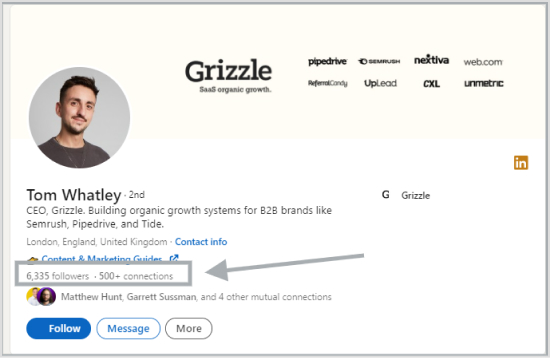
Tom Whatley’s LinkedIn profile bio section is rather simple. However, the connection count says it all. No wonder he gets a ton of traction on LinkedIn.
3. Optimized profile
LinkedIn SEO optimization is no joke, especially when you’re trying to do LinkedIn SEO. Many users confuse LinkedIn SEO with just LinkedIn articles (formerly Pulse). LinkedIn SEO is important for the profile, too.
To connect with the right audience, you must have an optimized, clear, well-crafted LinkedIn profile. LinkedIn profile optimization doesn’t only mean fixing up the description or injecting a handful of keywords into it.
An optimized LinkedIn profile must have the following ingredients:
- A crystal clear user bio: the name and job description must be written. Avoid writing taglines in the job description; they create confusion.
- A well-written profile description: A clear and concise description explaining your experience and expertise is necessary.
- The skills section: Add relevant skills to your LinkedIn profile to increase relevance, improve search performance, and make your profile look professional.
- Keywords and hashtags matter: Use your specific industry-related keywords and LinkedIn hashtags across all LinkedIn content, such as articles, posts, status, comments, etc.
Such LinkedIn profile optimization techniques could signal the LinkedIn algorithm and help rank your LinkedIn content.
Here’s an example:
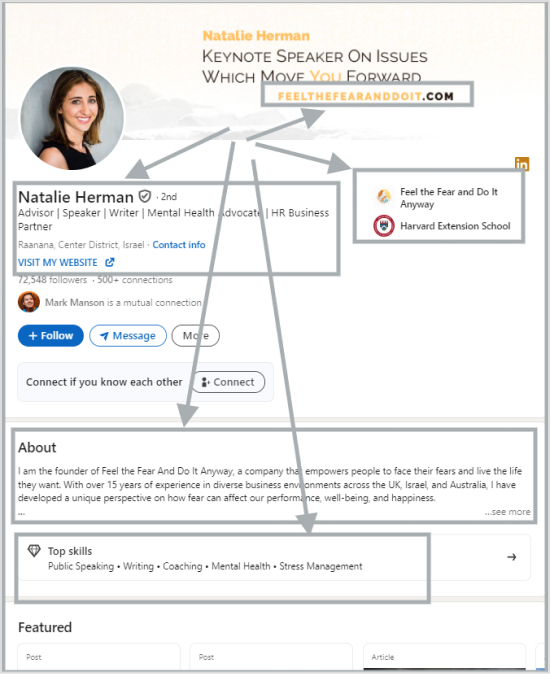
Natalie Herman has done it quite amazingly. She has a decent About section, her skills are mentioned, the website URL is highlighted in the cover image, and her bio is written. Overall, she has an optimized LinkedIn profile.
Also Read: Short bio examples that will impress your audience
4. Engagement level
LinkedIn is a social media network with an effective search system. This allows marketers, brands, bloggers, and influencers to utilize the search feature to reach more people.
One aspect of LinkedIn SEO is user engagement. Engagement triggers attention, visibility, and reach no matter what industry or niche you are in. It is considered a powerful SEO ranking factor regardless of the platform.
The secret to gaining more engagement on LinkedIn is to create relevant, helpful content for your audience and start conversations where possible. It’s been learned that high-quality content often sparks conversations. Don’t hesitate to initiate discussions with ice-breaker content, such as polls, quizzes, or memes.
The reality is that an engaging LinkedIn profile is likely to get more visibility and appearance than an inactive LinkedIn profile with no activities whatsoever.
Let’s take a look at this example:
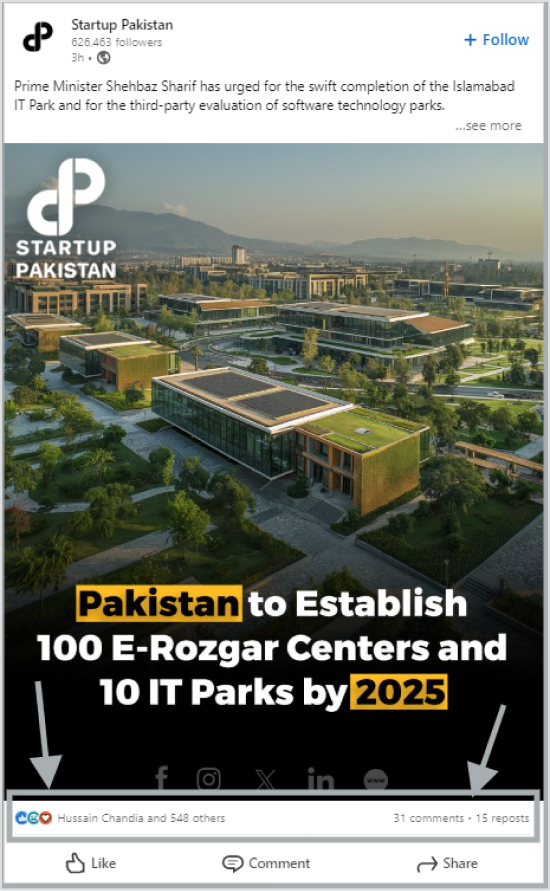
Startup Pakistan is a business news and updates blog that covers startup, commerce, and entrepreneurship-related news in Pakistan. It gets pretty good engagement on LinkedIn.
5. Network relevancy
Network relevancy means how relevant the LinkedIn contacts are. It is important to consider network relevancy when trying to connect with an industry-related audience.
One of the benefits of network relevancy is that it allows you to start conversations around your SEO topics or encourages you to share your content, which boosts your content’s SEO performance.
It’s best to surround yourself with a like-minded, relevant audience on LinkedIn, no matter your niche. Using LinkedIn for SEO will be fruitful.
So, network relevancy could be a LinkedIn SEO ranking factor for users who want to make the most of this platform.
Check out this example:
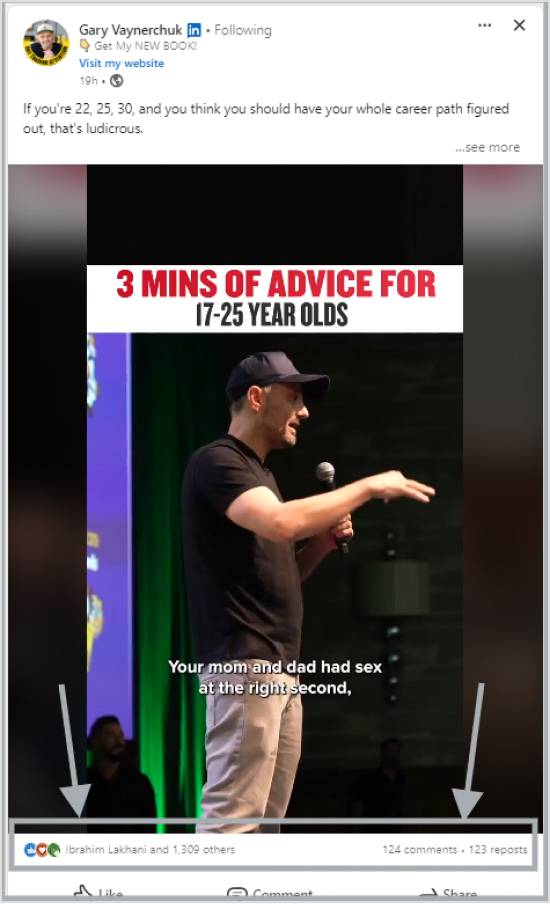
Gary Vaynerchuk is a well-known entrepreneur, business speaker, author, and social media expert. One of the core reasons why he is extremely popular on social media is that he has a very specific, relevant follower base. This shows that network relevancy matters a lot.
These are some of the LinkedIn SEO ranking factors that could be helpful for LinkedIn creators who are trying to create great content on LinkedIn and hope to crush it with their content strategy.
Steps to optimize your LinkedIn profile or page for SEO
Here are the essential steps to optimize LinkedIn profiles and pages for SEO:
1. Fix the bio section
To get started with a LinkedIn profile or page optimization, the user must look into the intro section of the profile—it’s the user bio area.
It’s the section that contains the user’s name, job description, company name, URL, and other contact details.
Here are some of the things you should do when fixing up the bio section:
- Start using a real, full name in the LinkedIn profile; a nickname or alias won’t cut it. It makes a LinkedIn profile look more professional.
- LinkedIn SEO optimization requires a LinkedIn user to include a proper designation in the bio, such as a graphics designer, Facebook ads expert, content writer, etc.
- Add a decent, bright headshot to your LinkedIn profile to ensure everyone can easily see your face.
- Please make sure that you have added the correct contact details on LinkedIn. Otherwise, it will create a bad impression.
- Include a simple yet meaningful LinkedIn cover on your profile or page. It must reflect your brand, personality, or industry.
Take a look at this example:
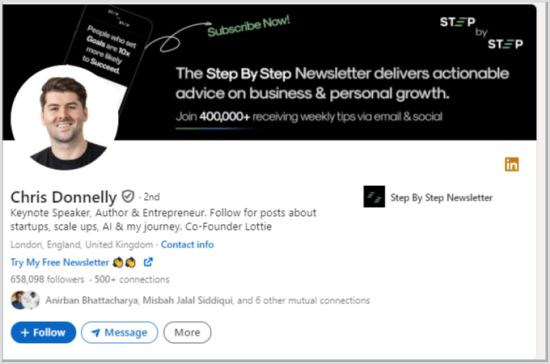
Chris Donnelly is a speaker, author, and social media influencer. He has written a perfect LinkedIn profile bio. It’s short, to the point, and relevant.
That’s pretty much it.
2. Write a compelling “About” section
LinkedIn users go to the “About” section (also known as the profile description) when they want to learn more details about a person.
About section of the LinkedIn profile is where users can provide details about their expertise, career goals, and past experiences. The users can add up to 2,600 characters long text to the About section.
Moreover, it’s crucial to LinkedIn SEO because it allows users to insert industry-related keywords that match their target audience’s intent to make their LinkedIn profile more visible in searches.
Here’s an example:
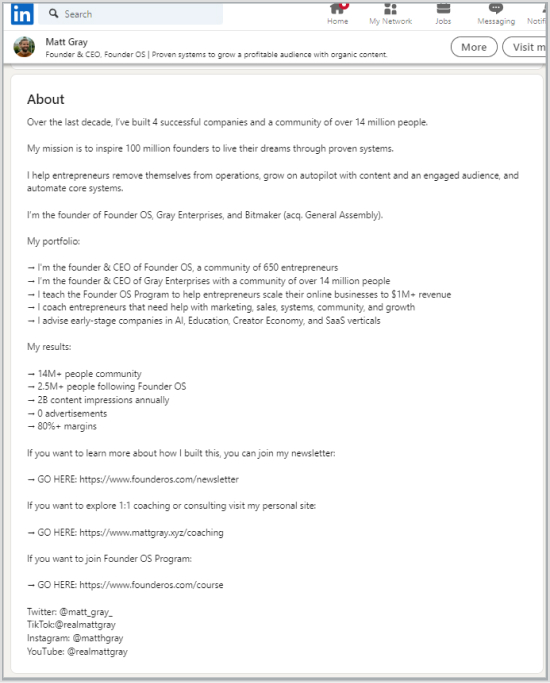
Matt Grey is the CEO of Founder OS, a curated community of founders that helps them grow their businesses. Matt has written an excellent “About” section on LinkedIn.
3. Add necessary credentials
LinkedIn profile or page optimization doesn’t only mean adding relevant keywords to the sections. It also includes inserting necessary credentials to fill in the sections’ gaps.
Several areas on a LinkedIn profile need to be optimized for SEO. One of them is the credentials that make any profile stand out. Let’s take a look at some of the credentials no one can afford to ignore:
- “Skills” is one area that massively impacts profile visibility and improves search appearance. Add relevant skills to your LinkedIn profile to optimize for SEO.
- Use the “Experience” section to showcase your past job experiences. At least four to five past job experiences help create profile credibility.
- The “Services” section allows users to add the services they offer. It does impact the LinkedIn profile SEO.
- The “Education” part tells the audience about your education. Make sure to add degrees or certificates you have earned over the years.
All these necessary credentials make your LinkedIn profile worth checking out. Don’t sleep on this opportunity by ignoring any of these areas on the LinkedIn profile.
Check out this example:
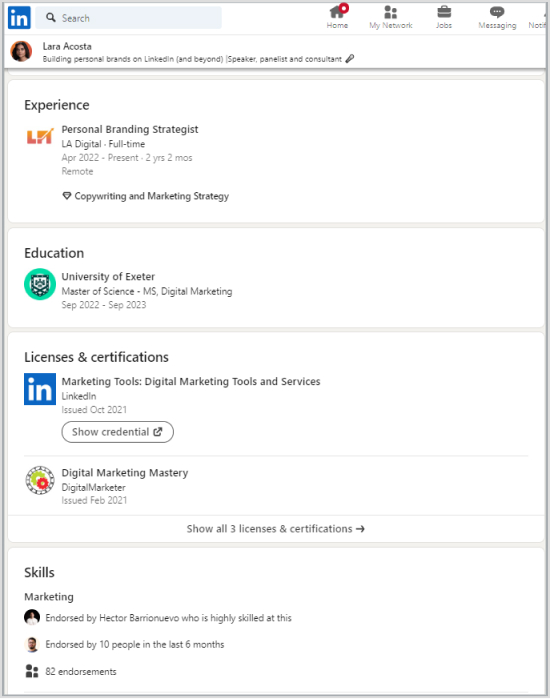
Lara Acosta is a business coach, personal branding expert, and strategist. She has added several credentials to her LinkedIn profile, which makes her LinkedIn profile appealing and impactful.
4. Enable creator mode
LinkedIn creator mode is a value-added feature that provides access to additional LinkedIn features.
However, enabling LinkedIn mode doesn’t directly impact LinkedIn SEO. Instead, it enables LinkedIn users to access some of the features turned off otherwise.
The key features of LinkedIn creator mode are analytics, LinkedIn Live, follow links, and newsletter.
Creator mode gives you access to your LinkedIn analytics, which is useful for users who are trying to optimize LinkedIn content.
5. Keep track of your LinkedIn content
Optimization isn’t just about adding the right keywords/hashtags or fine-tuning the text sections—monitoring content performance matters, too.
A LinkedIn user writes comments, publishes articles, posts videos and images, and creates polls to stay relevant and attract new eyeballs.
Keeping track of your LinkedIn content gives you an idea of what’s working for you and what people aren’t interested in.
So, don’t overlook LinkedIn analytics. Check your statistics once in a while to improve your LinkedIn content strategy.
5 tools for LinkedIn SEO
Let’s take a look at some of the best LinkedIn SEO tools to try out:
1. ContentStudio
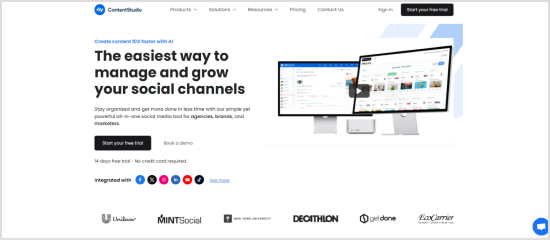
ContentStudio is a state-of-the-art social media management dashboard that offers social media scheduling, analytics, blog publishing, AI writing assistance, workflow approval, and much more. It’s an award-winning tool for marketers, brands, agencies, and influencers. ContentStudio can be useful in scheduling, publishing, and analyzing LinkedIn content.
Experience organized workflow with a unified social media management platform for agencies.
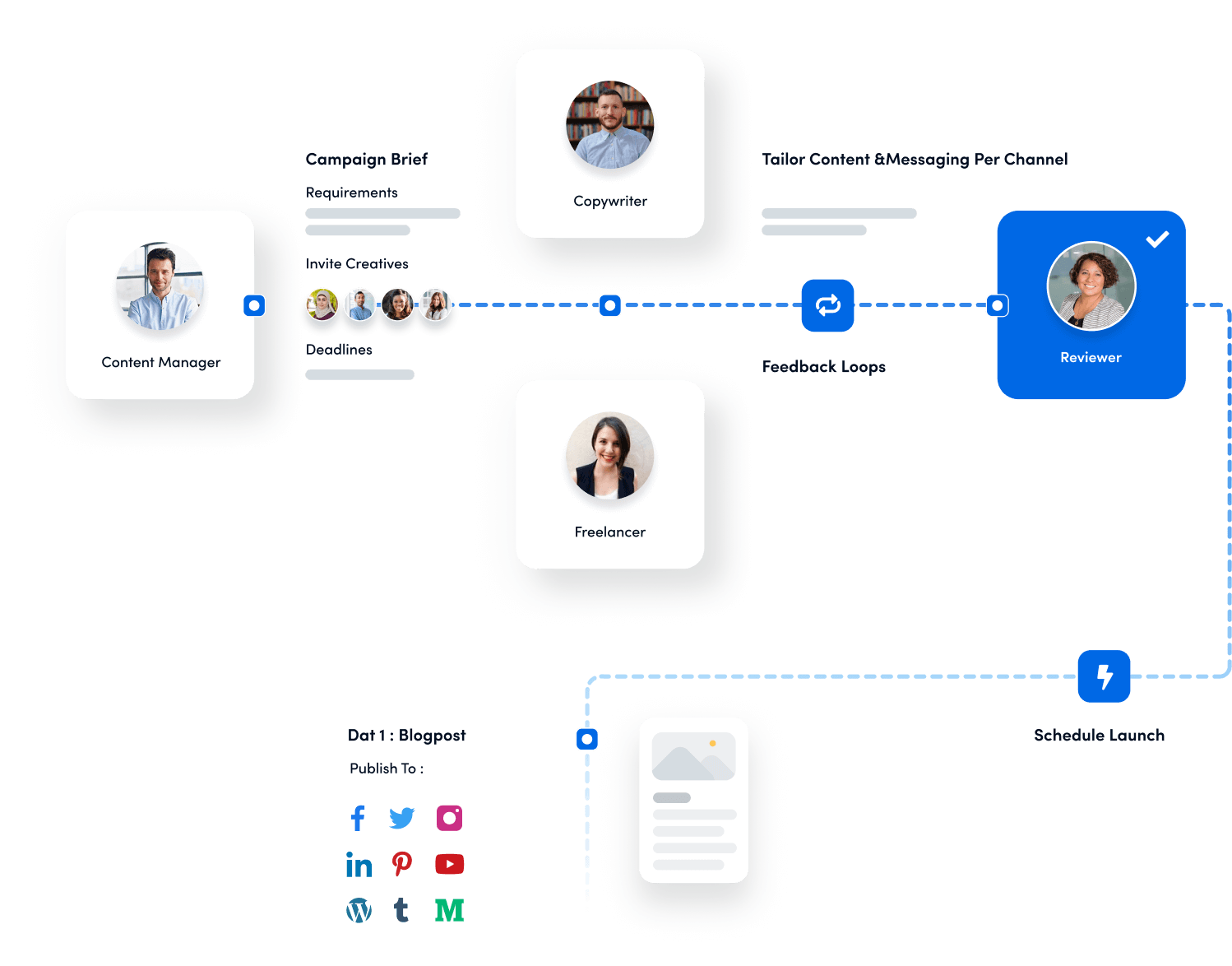
2. Replug
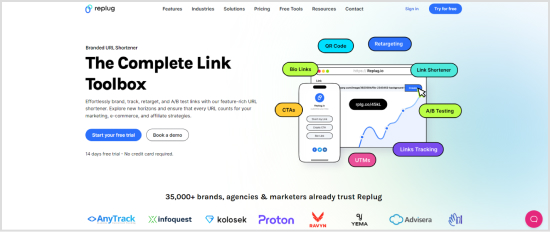
Replug is a powerful link management tool that provides several URL management services, such as URL shortening, URL tracking, UTM parameters, deep links, A/B testing, retargeting, and bio links. Replug could be useful when running a LinkedIn SEO campaign as it can create and track short URLs for LinkedIn campaigns.
3. ContentStudio’s LinkedIn post generator
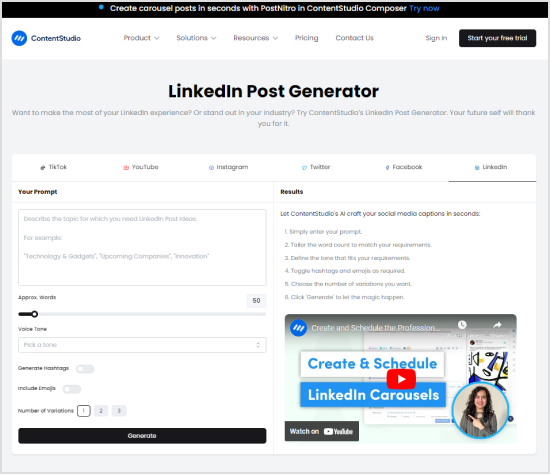
This free tool is an AI-powered LinkedIn post generator that uses artificial intelligence to analyze the LinkedIn creator’s tone and create similar posts. All it requires from the user is to provide the username of the LinkedIn creator or influencer to analyze and generate posts. The LinkedIn post generator can be useful in the LinkedIn SEO arsenal.
Read the complete guide: How to craft professional posts with LinkedIn post generator for free?
4. ContentStudio’s LinkedIn hashtag generator
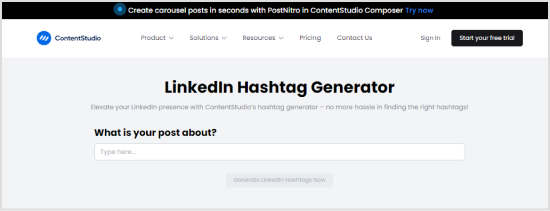
ContentStudio’s free LinkedIn hashtag generator is a simple tool for creating LinkedIn hashtags. It allows users to input details, such as a little info about the LinkedIn post. Once entered, it can quickly create relevant hashtags for LinkedIn. This tool speeds up LinkedIn publishing and makes it quite easy to post on LinkedIn.
Go through: How to use hashtags on LinkedIn in 2024
5. Canva

Canva is an excellent image maker and video editing tool that provides a handful of tools for creating social media, marketing, promotional, and educational visual content. It’s an easy-to-use online tool allowing users to create images, videos, banners, infographics, logos, and more. LinkedIn SEO can’t be done without images, whether you’re publishing LinkedIn articles or publishing LinkedIn posts. So, Canva can be pretty useful in your LinkedIn SEO endeavor.
Conclusion: rank high on LinkedIn today
Are you excited to crank up the notch on LinkedIn? Putting out content on LinkedIn without a plan won’t work out. One needs to think this through before creating or scheduling LinkedIn posts in bulk.
To rank higher on LinkedIn, analyze what’s working for others. Then, handpick the hot topics in your industry and create various posts around those topics: images, write-ups, videos, infographics, etc.
Start posting on LinkedIn; use a social media scheduling tool to schedule posts for the next few weeks. While the LinkedIn posts are being published on autopilot, keep your scavenger hunt going for the next LinkedIn SEO topics and keywords to target.
Track your LinkedIn content performance through the Analytics section on the profile. Find out which posts are outperforming others. You might want to double down on the areas/topics that work well for you.
LinkedIn SEO success doesn’t happen on a whim; it takes some time before you start to get the hang of it. Don’t stop experimenting with different keywords and topics to find the perfect combo, and things will start to work for you.
Social Media Analytics Fine-tune your social media strategy for success with in-depth analytics and white-labeled reports.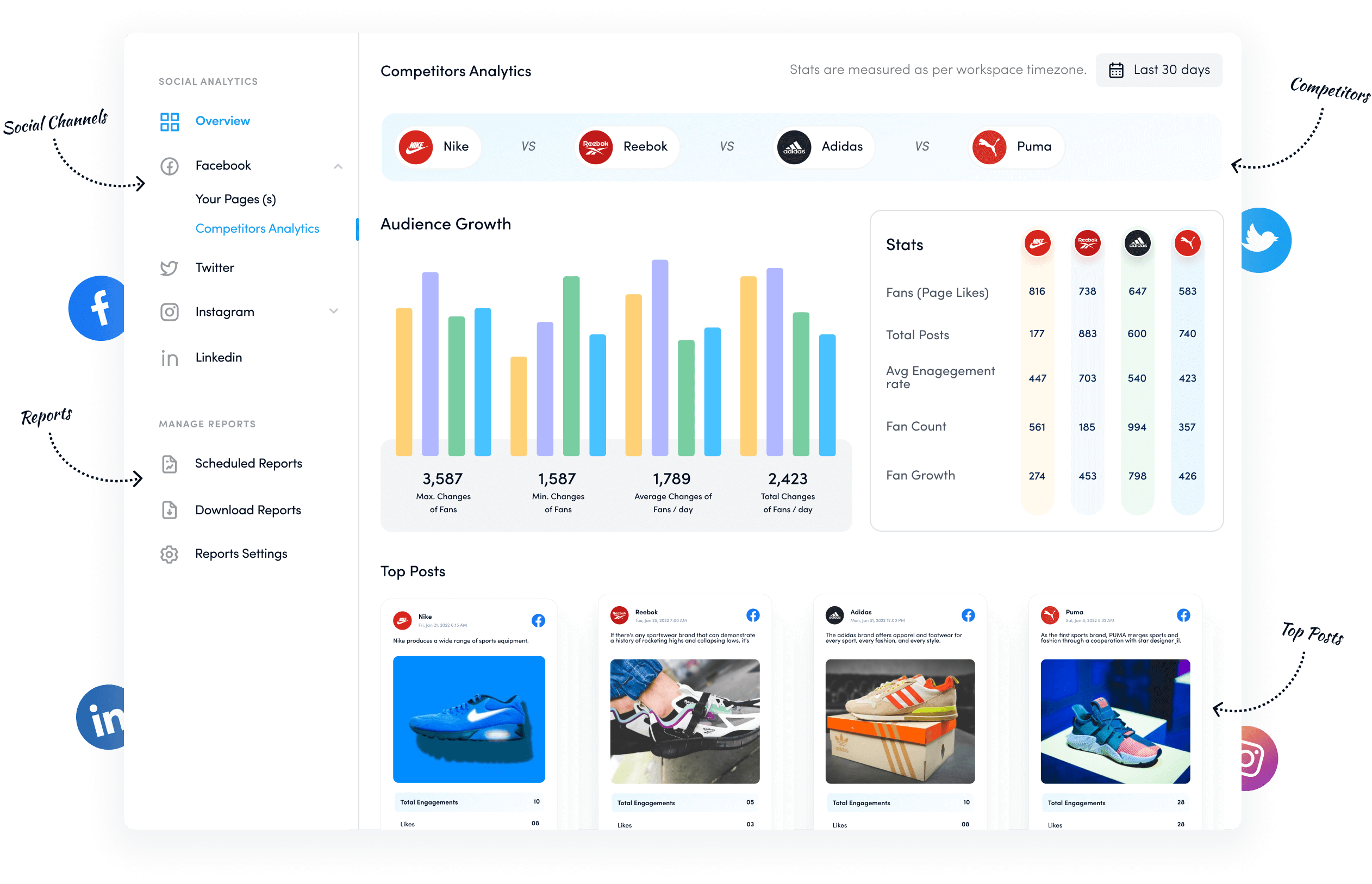
FAQs About LinkedIn SEO
Can you do SEO on LinkedIn?
Yes, you can do SEO on LinkedIn. You only need to know the basics of SEO and the LinkedIn platform to make it work. Create a relevant, optimized profile and LinkedIn content around popular topics in your industry – that’s pretty much it.
How to find SEO keywords for LinkedIn?
You can check out the LinkedIn hashtag’s popularity, use the search section to find out about the discussed topics, check out the industry-related LinkedIn groups, and look through the timeline. You’ll get a pretty good idea of what people are searching for or need to know. All you have to do is to be connected with like-minded people on LinkedIn.
Can LinkedIn articles significantly improve my SEO?
LinkedIn posts and articles do rank well in Google, especially after the recent Google algorithm updates in 2023-2024, so it’s safe to say that LinkedIn articles work well for SEO, at least for now.
Recommended for you
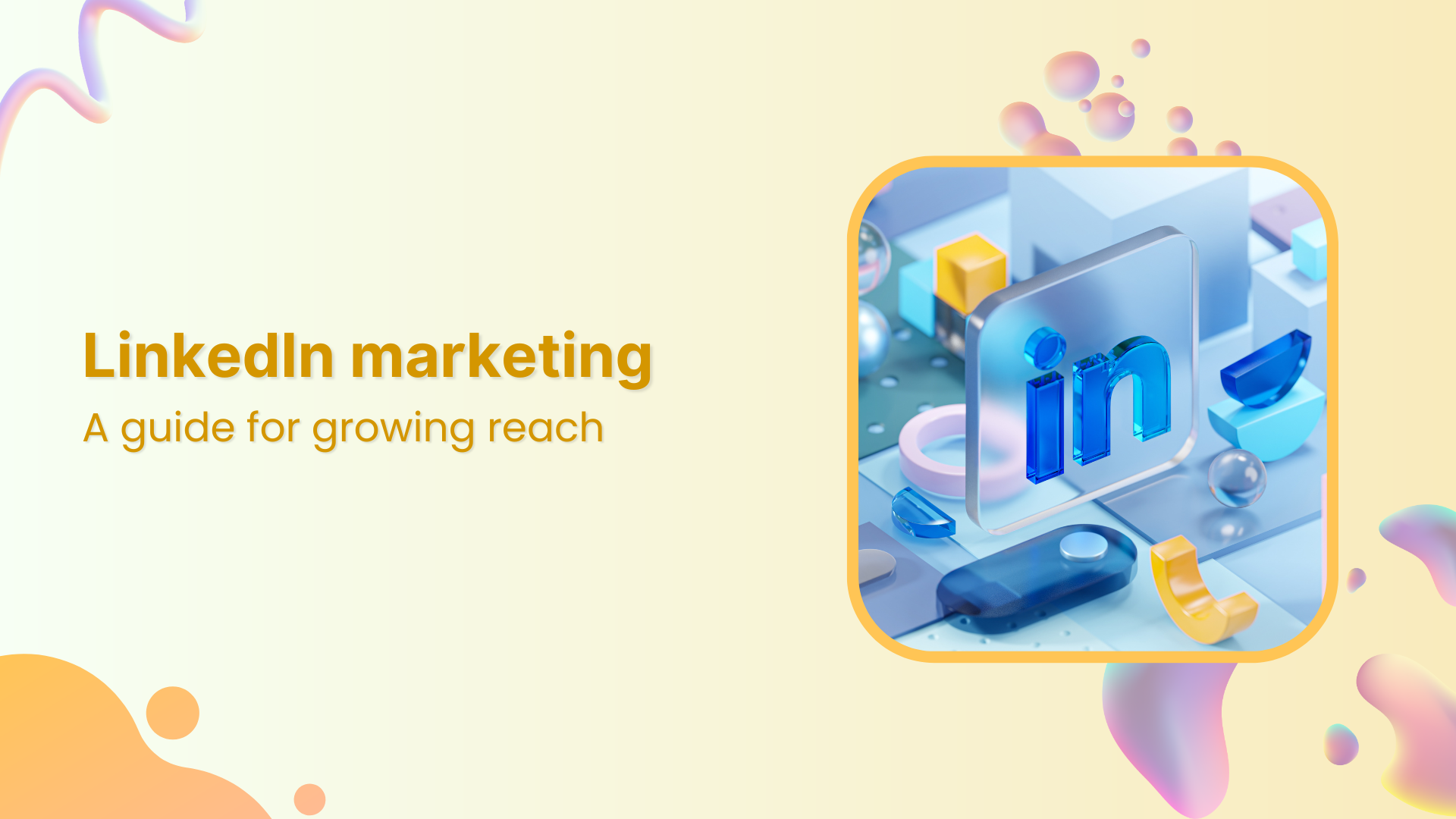
LinkedIn marketing in 2026: a practical guide for growing reach
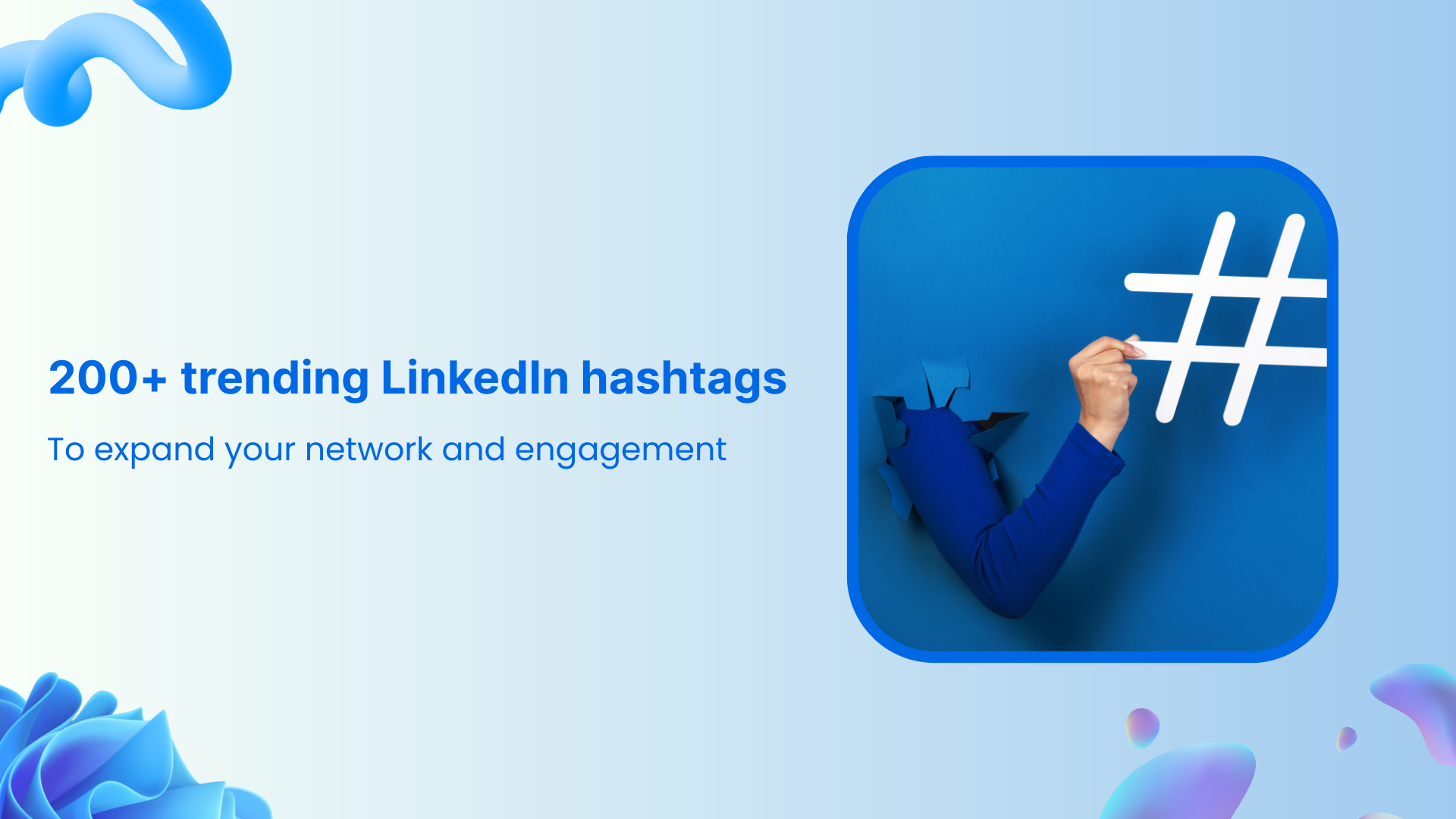
200+ trending LinkedIn hashtags to expand your network and engagement


Powerful social media management software
14-day free trial - No credit card required.
